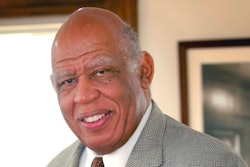In 2006, I started working on my dissertation, a process that led me on a beautiful journey.
The journey began with a visit to Fisk University in Nashville, Tenn., the home of Charles Spurgeon Johnson’s presidential papers. I was interested in Johnson because he was one of the first African-American presidents of a historically Black institution and he worked extensively with White philanthropists. I wanted to understand how African-American leaders in the South navigated the murky waters of White philanthropy.
Over the course of writing my dissertation, I visited Fisk nearly ten times, staying about a week for each visit. During my visits, I became acquainted with a lovely man ― Leslie M. “Doc” Collins, an English professor at the historic Nashville institution. Collins began teaching at Fisk in 1945 and was a wealth of knowledge about Fisk’s history. I was honored to interview him for my dissertation; he was one of a few people who worked with Charles S. Johnson and could detail Johnson’s leadership style.
What I liked most about Collins was that he didn’t mince words or pussyfoot around tough topics. He was forthright in his praise and criticism of Johnson and helped me to craft a nuanced and rich biography of the president. Professor Collins passed away on Sunday, February 23, 2014 at 99 years of age and left a beautiful legacy in all of the students that he taught and mentored.
Just five days later, another Fisk icon passed away.
Lee Lorch, who taught math at Fisk, died at 98 years old on February 28, 2014. Lorch was not your average professor. He was an activist for civil rights and civil liberties and for equity in society; he was instrumental in forcing the desegregation of Stuyvesant Town, a housing development in New York City.
Charles S. Johnson hired Lorch in 1950 to teach math at Fisk when no one else would take a risk on Lorch. The math professor was an inspiration to students and single-handedly mentored and prepared more African-American mathematicians than any of his contemporaries in the U.S.






















